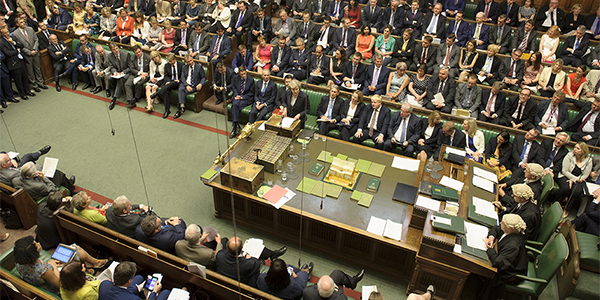This government has already lost the confidence of the House of Commons: the response should be to replace the government, not to neuter parliament
The government and Parliament cannot agree how to proceed with Brexit. For some, the solution is for the government to prorogue Parliament and implement its Withdrawal Agreement without the confidence of the Commons. David Howarth argues that given the Fixed Term Parliament Act means a general election will not necessarily follow from such a loss of confidence, a new government formed by MPs from across the Commons is a viable option.

Picture: UK Parliament/Jessica Taylor, via Parliamentary Copyright
A basic rule of the British constitution is that governments are not allowed to govern unless they retain the confidence of the House of Commons. We can have interim governments that are not, to use an old term, ‘responsible’ governments, that is governments in which the Commons has confidence, but only responsible governments can exercise the full range of governmental powers.
But more recently, in response to moves by the Commons to give itself more time to debate Brexit, several commentators, including a former very senior civil servant and two Oxford professors, have suggested an additional principle: that Parliament only exists if it retains the confidence of the government.
They say that if the government believes that the Commons acts in ways to which the government objects (acting ‘unconstitutionally’, to use their language, though in their scheme the government alone decides what is ‘unconstitutional’), the government can neuter the Commons. They say, for example, that the Prime Minister can ask the Queen to veto bills passed by Parliament or even, according to Professor John Finnis, suspend Parliament completely by asking the Queen to ‘prorogue’ it, that is to end the current session of Parliament and deliberately to delay starting the next one.
The idea that Parliament needs the government’s confidence is startling, but it is not completely unfounded. Our system requires the existence of responsible government and for responsible government to be re-established quickly when an existing government fails. Before the Fixed Term Parliaments Act, following a precedent of 1784, prime ministers who lost the confidence of the House were normally entitled to a dissolution of Parliament and a general election, the point of calling the election being to re-establish responsible government in a new House of Commons.
But the Fixed Term Parliaments Act removes the government’s entitlement to an election, putting the power to call elections into the hands of the Commons itself. And so now, the only route for quickly re-establishing responsible government when an existing government fails, and Parliament is unwilling to call an election, is for the government to resign and for a new government to be formed without an election.
The current situation is unsatisfactory precisely because Theresa May’s government has in reality lost the confidence of the House, but no one seems willing to recognise it. The fact that we are even talking about a prime minister asking the Queen to veto a bill illustrates the point. A prime minister who asked for the exercise of the veto would by that very act be acknowledging that she had lost the confidence of the House.
And yet the government struggles on, hoping that the next vote will re-establish its control. Perhaps it will. But in the meantime, the system is in limbo, with a government that is not responsible pretending to be a responsible government.
It cannot be right for a government whose own legitimacy is in doubt to be allowed to look for new ways to undermine the Commons. That would be a denial of parliamentary democracy. Moreover, the ways suggested for carrying it out bring the Queen into politics and threaten constitutional monarchy. Most of all, these manoeuvres leave the problem of the lack of responsible government entirely untouched. Closing down Parliament cannot count as a way of establishing that the government has the confidence of the House of Commons.
The constitutional way out of the problem, if Parliament is not willing to call an election (and, politically, that would be entirely understandable) is to form a new government drawing majority support from across the House. That is why MPs have already started to talk about a government of national unity. These MPs understand the constitution better than any number of former civil servants and Oxford professors.
This article gives the views of the author, and not the position of Democratic Audit.
About the author

David Howarth is Professor of Law and Public Policy, University of Cambridge.





 Democratic Audit's core funding is provided by the Joseph Rowntree Charitable Trust. Additional funding is provided by the London School of Economics.
Democratic Audit's core funding is provided by the Joseph Rowntree Charitable Trust. Additional funding is provided by the London School of Economics.